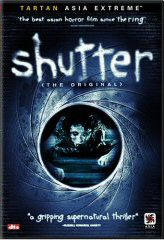
Walking the delicate tight-rope between the psychological and the supernatural that has preoccupied audiences since the incarnation of the movie house, Asian supernatural tragedies have long since proved themselves capable of examining not only ghosts but people -- doomed and tormented individuals caught up in situations that demand they grapple not only with deadly external forces but the black pits of their own hearts. The characters in Shutter, the most evocative, frightening ghost story since Ju-On, follow in this tradition, merging supernatural vengeance with psychology as people discover upsetting truths about each other and themselves. These are people with real histories, emotions, and motivations. Combining nightmarish imagery with pertinent issues of society and culture, Shutter grapples with such mature themes as death, the unknown, and alienation, all the while focusing on personal culpability. Treating the supernatural as a catalyst for personal exploration, and questioning the nature of both love and reality, this well paced, sleek chiller achieves more through suggestion than bloodshed. A ghost story not afraid to embrace the conventions of the genre, the plot is also careful to dig deep down into insecurities about ourselves. The result is a picture both intrusive and frightening.
The plot of Shutter, while at first glance seeming repetitive of such Asian hits as the much copied Ringu, is, in fact, a quite original blend of the occult and psychological. A bleak statement on the nature of love, guilt, and spectral justice, this film may take some stylistic/thematic hints from traditional stories (and what stories don't, particularly ghost stories?!), but both the narrative structure and themes are unique in their insistence to subvert reality while revealing the impossibility of truly knowing anyone. Beginning as many first rate urban legends and folk tales do, we begin with a dark night on a lonely road in the country, as Tun and Jane, not paying attention, hit a mysterious pedestrian. Making the bad decision to flee the scene, they attempt to return to some semblance of normalcy in Bangkok. Soon, though, they discover that nothing will ever be the same for them again. Jane is attacked by nightmares, haunted by culpability and strange nameless terror while Tun, a photographer, begins to see spectral shapes in his work. When they are compelled to return to the scene, they find no trace of the accident, no news of it period. But nightmares haunt Jane while Tun realizes the specter haunting him may belong to an unfortunate girl who he scorned, driving her to madness. Tun's closest friends and associates begin to die as Tun and Jane realize they are dealing with something horrible, something powerful, something dead . . . and they only have a short time before their sin catches up with them.
Ghost stories were our earliest stories, told by primal man as he stared through the darkness. We haven't changed all that much in this new century. Despite technological advances and a self satisfaction that smacks of ignorance and arrogance, and contrary to Hollywood's low opinion of supernatural drama, we all fear similar facets of life and the unknown. In Shutter, these fears are proved well founded, coming from surprising directions, both from without and within ourselves. Similar to ancient Greek tragedy, thought to purge audiences of their terror and baser instincts, this film allows us to endure the horrific under the pretense of entertainment. We need ghost stories as much as ever, particularly ones that terrify even as they challenge and disrupt, forcing us to ponder our lives as much as the threat of death. Shutter achieves this catharsis, merging thoughtful suspense and human drama with the sheer exploitative pleasures of the occult tale, using lurking shadows and palpable atmosphere to convince us of nightmares. More importantly, the director emphasizes real-to-life characters whose trials and attitudes ring true, daring us to see aspects of ourselves within their own torn lives. Shutter evokes the mystery and terror of the uncanny by basing its fantastic ghostly elements in the strictly defined actions of the everyday, giving the spectral a closer relationship to realism, and thereby making the story more accessible and frightening on a personal level. White knuckles terrifying!
Tartan Asia Extreme presents Shutter with its customary amount of respect for visual and audio quality. The anamorphic widescreen print is flawless, clean and without any noticeable distortion. Colors are clean and moody, and flesh tones realistic. The Dolby Digital Thai language track is clear and crisp, featuring English and Spanish subtitles. Extras are sparse but informative, featuring the usual mix of fluff and noteworthy analysis of the cast/crew and story process, including Interviews with the Director and Cast, Behind-the-Scenes footage, and Trailers.
Review by William P. Simmons
| Released by Tartan Asia Extreme USA |
| Region 1 - NTSC |
| Not Rated |
| Extras : |
| see main review |